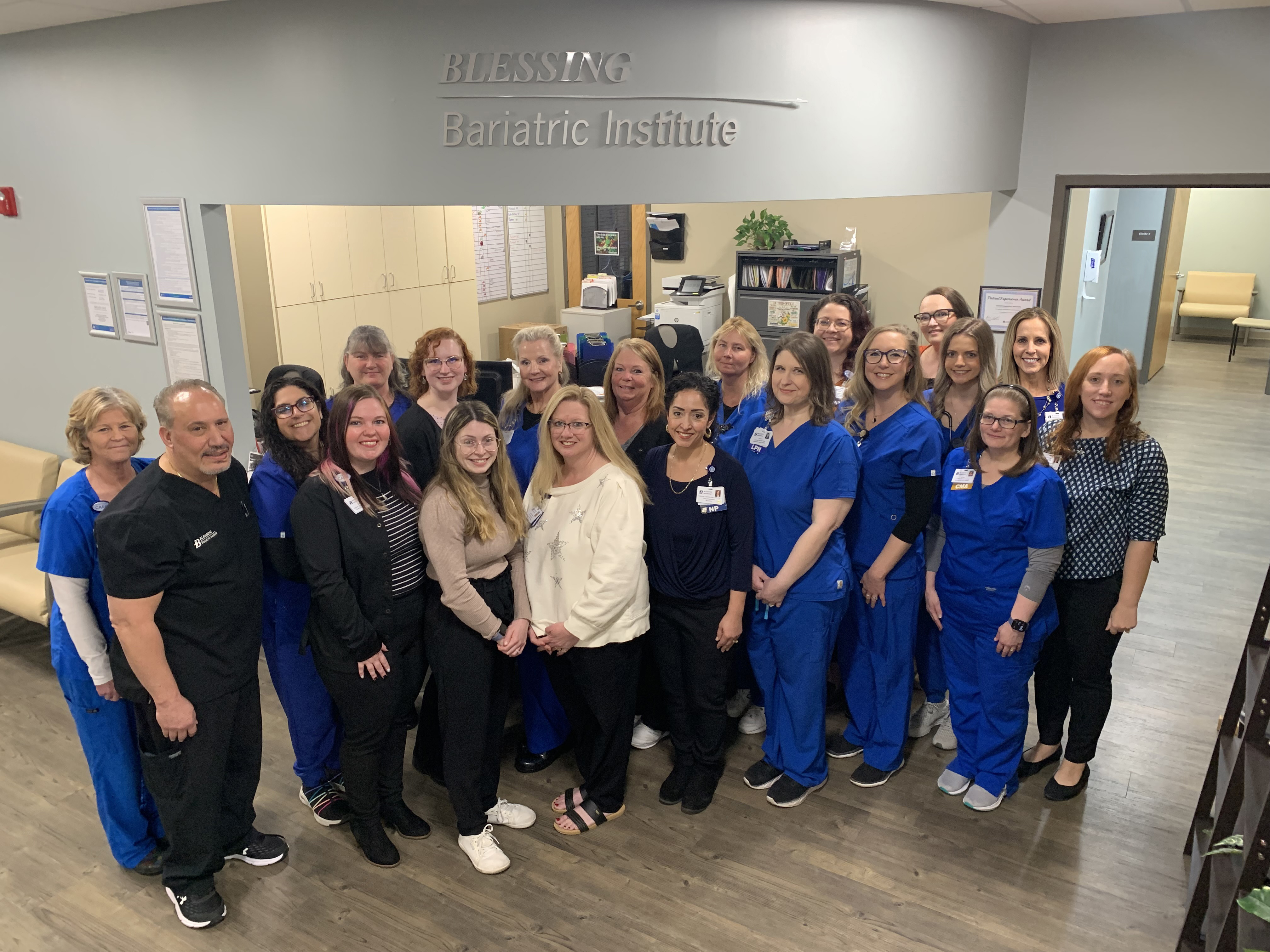
Since the program began in 2020, patients have lost 137,058 pounds, or 68.5 tons. That includes a total of 91,021 pounds, or 45.5 tons, lost by nearly 13,000 medically managed weight loss program patients and 46,037 pounds, or 23 tons, lost by more than 530 bariatric surgery program patients.
“We have made an incredible impact in the communities Blessing serves,” said Fernando B. Bonanni Jr., MD, MBA, FACS, FASMBS, medical director, Blessing Bariatric Institute. Dr. Bonanni is a fellow of the American Society for Metabolic and Bariatric Surgery. “Obesity is the leading cause of preventable death in our country.”
Individuals are considered morbidly obese typically if their weight is more than 80 to 100 pounds above their ideal body weight. That translates to a Body Mass Index (BMI) above 40. Complications of morbid obesity include but are not limited to heart disease, cancer, diabetes, kidney disease, stroke, sleep apnea, arthritis and depression.
“The Blessing Bariatric Institute offers comprehensive lifelong treatment of obesity through medical or surgical weight loss,” Dr. Bonanni added. “Most importantly, we are able to combine both, if that is required by the patient, to help them achieve and maintain a healthy weight.”
From the patient’s point-of-view
For most of her life, Andrea Turek, the mother of three, was overweight and at times was obese, according to the medical definition.
“I was miserable,” the Blessing Hospital nurse explained. “I didn’t feel good. I didn’t look good. I didn’t want to keep living that way.”
In 2020 she had bariatric surgery with Dr Bonanni and lost 175 pounds. Andrea no longer needs to take high blood pressure medication and her heartbeat, which was too fast when she was obese, returned to normal.
“I didn’t realize the things I was missing out on as a mom,” Andrea said. “I didn’t want to go on walks with my kids for example, because I had no energy. I felt miserable. Now, I am the one who says, ‘Let’s go!’ because I feel better and I want to do more.”
“Then there is body self-consciousness,” she concluded. “I remember being embarrassed at my daughter’s softball games and at other public gatherings. Now, I am not. It’s very freeing.”
The Blessing Bariatric Institute provides three surgical procedures. Each is explained on the Blessing Health website.
When Meredith Humphrey stepped on the scale and saw it reach 252 pounds, she reached out to the Blessing Bariatric Institute’s Medically Managed Weight Loss program for help. Meredith lost more than 100 pounds.
“I really noticed a change in energy and confidence,” she said as a result of shedding her excess weight. “I have more confidence now than I have had in a long time. I feel good about myself. I feel better when I look in the mirror, I hold up clothes and I think, ‘That looks really small.’ But then it fits. That brings a happiness, a joy that I was missing,” Meredith, a Blessing employee, said.
The Medically Managed Weight Loss program helps people lose weight through the use of individually selected medications that can either manage hunger, address cravings, or both, in association with carefully crafted goals made in partnership with a nurse practitioner, dietician and counselor.
About the Blessing Bariatric Institute
The Institute is located on the campus of Blessing Hospital in Quincy, Illinois. It is accredited by the national Metabolic and Bariatric Surgery Accreditation and Quality Improvement Program,
In addition to Dr. Bonanni, Melissa Matrisch, MD, performs surgery at the Blessing Bariatric Institute. She received her training at the Cleveland Clinic Center for Advanced Skills Training in Bariatric Surgery. The bariatric surgery team also includes Jennifer Holcomb, APRN-FNP, bariatric center coordinator, and Laurel Sexton, NP.
The medically-managed weight loss provider team includes medical director Abby Reich, MD, and Dr. Erik Meidl, MD, both certified by the American Board of Obesity Medicine; Christina Remmert, DO, Veronica Roth Phillips, APRN-FNP, and Kristin Bradshaw, NP.
For more information including videos, frequently asked questions and an online process that allows Institute staff and the individual to determine if bariatric treatment is right for them, go to blessinghealth.org/bariatric.
